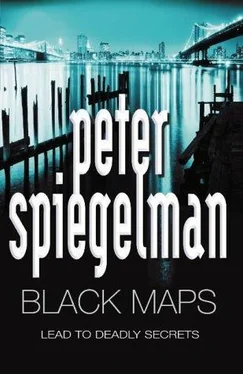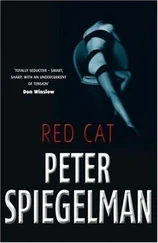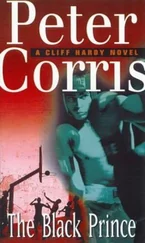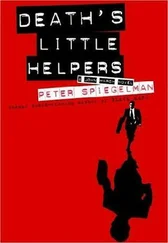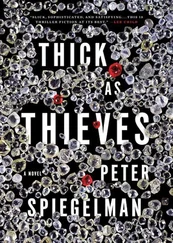Peter Spiegelman - Black Maps
Здесь есть возможность читать онлайн «Peter Spiegelman - Black Maps» весь текст электронной книги совершенно бесплатно (целиком полную версию без сокращений). В некоторых случаях можно слушать аудио, скачать через торрент в формате fb2 и присутствует краткое содержание. Жанр: Криминальный детектив, на английском языке. Описание произведения, (предисловие) а так же отзывы посетителей доступны на портале библиотеки ЛибКат.
- Название:Black Maps
- Автор:
- Жанр:
- Год:неизвестен
- ISBN:нет данных
- Рейтинг книги:4 / 5. Голосов: 1
-
Избранное:Добавить в избранное
- Отзывы:
-
Ваша оценка:
- 80
- 1
- 2
- 3
- 4
- 5
Black Maps: краткое содержание, описание и аннотация
Предлагаем к чтению аннотацию, описание, краткое содержание или предисловие (зависит от того, что написал сам автор книги «Black Maps»). Если вы не нашли необходимую информацию о книге — напишите в комментариях, мы постараемся отыскать её.
Black Maps — читать онлайн бесплатно полную книгу (весь текст) целиком
Ниже представлен текст книги, разбитый по страницам. Система сохранения места последней прочитанной страницы, позволяет с удобством читать онлайн бесплатно книгу «Black Maps», без необходимости каждый раз заново искать на чём Вы остановились. Поставьте закладку, и сможете в любой момент перейти на страницу, на которой закончили чтение.
Интервал:
Закладка:
Personally, I use the services all the time. Provide them with your subject’s name, and you’ll get back a list of people, complete with addresses and phone numbers, which just might contain the person that you want. The more data you can supply-a city, a state, maybe a date of birth-the better your results. And you can get more than just addresses and phone numbers. Many services provide information on criminal convictions, property ownership, bankruptcy filings, marriages, divorces-a whole range of public data. Much of it is available immediately, online. But while the services are big timesavers, they’re not magic. If you’ve got nothing more to go on than a name, and that name isn’t Rufus T. Firefly, or something equally distinctive, you may get back a very long list indeed. And then it’s time for some old-fashioned legwork, or, as in this case, phone work.
By Monday afternoon, I’d been through nine A. Burrowses, Ada included. That was over half the number I’d turned up in a search restricted to the New York metropolitan area. Based on what Pierro had told me, the A-for-Al Burrows I was looking for was a white male, over six feet tall, and by now in his late forties or early fifties. Eighteen years ago he’d been heavyset and had thinning, dirty blond hair. By now he could be a bald blimp or, technology being what it is, a skinny redhead. No way to know until I found him.
Ada’s father was my second dead A. Burrows, the other one having been run over crossing Queens Boulevard two years go, at age twenty-seven. His mother was inconsolable still, and I was sorry that I’d bothered her. I’d found Albert Burrows, out in Chatham, New Jersey, who might have been the right age, but who assured me, in barely civil tones, that he’d never worked in banking, and that eighteen years ago he’d been living in Capetown. Arthur Burrows, of Dobbs Ferry, was also about the right age, but his career had been in B amp;E and GTA, and eighteen years ago he’d been right in the middle of his second nickel bit upstate. Next to Ada, he was the chattiest Burrows I’d spoken with, and he told me more than I wanted to know about his personal relationship with God.
I’d found an Alexander in Katonah, who was in banking, but who’d been in junior high at the time in question. And I’d found Alberta, Arlene, Akeema, Amy, and Alyssa Burrows, scattered about the Bronx, Brooklyn, and Staten Island. Some were suspicious, some annoyed, others impatient, and a few downright surly, but none knew any man by the name of Al Burrows-or would tell me, if they did. I had just two Manhattan names on my list. Alfred Burrows had turned out to be a thirty-year — old black man; Alan Burrows was, so far, just a voice on an answering machine.
I shut down my laptop and pushed my chair back from the long oak table that serves as my desk. I stretched and worked the kinks out of my neck. Between dialing for Burrowses, checking in with Mike, and talking to Tom Neary, I’d been on the phone for most of the day. I’d told Mike about my walk in the park and about my meeting with our client. He’d already heard from Pierro.
“He called to thank me,” Mike had said, “for bringing you in on this. He said it was a great move, and that you were a great guy, and that everything would be great.”
“Great,” I’d said.
Mike had chuckled. “He’s a salesman-you’ve got to make allowances.”
“Is he really as optimistic as he sounds about all this?” I’d asked.
“At some level. Mostly, I think he’s boxed it up in his head and pushed it off to the side.”
“It works, if you can keep it up,” I’d said.
“It takes a lot of energy.”
I’d told Mike about my meet with Neary, too. He went quiet at the mention of Fred Pell.
“Another reason to go carefully,” he’d said after a while. I hadn’t replied. “I’ll interpret your silence as agreement,” he’d said hopefully and rung off.
Neary’s call came right after. I could have my tour today, he’d told me, if I could meet him at the MWB offices at three-thirty. I was surprised, and pleased, that he’d gotten back to me so soon, and said okay. I rubbed my eyes and checked my watch; it was one-thirty-just enough time for a run.
It had dried out over the weekend, but was still blustery, so I pulled on tights and a wind shell. I headed due west, toward the piers along the Hudson. I hadn’t much time, and I’d done a long run on Sunday, so I was aiming for a quick four miles. I turned north at the river, toward Chelsea Piers. I was running into a steady wind now, and it was an effort to keep an eight-minute pace. The wind eased as I came up to 23rd Street, and I picked it up a little. As I ran, my thoughts turned, not for the first time, to my new neighbor.
I’d seen Jane Lu only once since knocking on her door, and then only briefly. She’d been leaving the building as I was coming back from my run on Sunday morning. She was with a clean-cut, frat-boy type with blond hair and lots of teeth. She was wearing jeans, an orange turtleneck, and tiny, wire-rimmed sunglasses, and she’d given me a smile and a friendly hello. After fifteen fast miles, I wasn’t sure that I’d said anything coherent in return.
She’d been nice as pie to me on Friday night-apologizing profusely for the noise, confessing her kickboxing mania, explaining that she’d been working with my sister, Lauren, for the past six months. She even offered me a Pepsi. And the nicer she was, the more ridiculous I’d felt for having been so irritated. At some point it had dawned on me that Jane recognized my discomfort, and so was being particularly gracious-the better to see me squirm. I’d found this interesting, if slightly annoying. There was a lot interesting about Jane-her considerable physical appeal, her rich, easy laugh, and the powerful intellect that gleamed in her dark eyes. I’d talked with her, with her doing most of the talking, for about twenty minutes before going downstairs, to bed.
I was back from my run in thirty-three minutes. I stretched and showered quickly, and dressed in gray trousers, a white shirt, a blue blazer, and a red paisley tie. And then I headed downtown.
I got off the subway at Wall and William, and walked south. Daylight had begun to fade, and the dark, narrow streets were growing darker. Soon the markets would close and the streets would fill with homeward pandemonium, but just now they were quiet. A few people stood at the entrances of buildings-smoking, talking, watching the traffic pass; a few others made for the subway-the first small trickle of the evening rush. A couple of TV news vans were parked near the old Morgan Guaranty building. Technicians snaked cables on the pavement out front, and bantered with the cops at the Exchange. A group of tourists rested on the worn steps of Federal Hall, studying their maps and debating their next destination. Some street vendors were shutting down for the day; others were setting up. Quiet for Wall Street. Quieter than it was those summers, a century back, when I’d worked down here; quieter than just a couple of years ago-before the party ended, before the bubble burst, and the triumphal march of the imperial CEOs and celebrity analysts finished in a string of perp walks. Quieter than it was before the towers. Maybe it was my imagination, or something the neighborhood brings out in me, but the faces seemed paler, more tired, more worn and used up than I remembered. Maybe it was just a trick of the light.
I knew from Mike’s file that, apart from its London headquarters, New York had been MWB’s largest office. The bank had been the marquis tenant in a prestigious tower at the bottom of Broad Street. It had occupied a quarter of the building, and its executive suites and dining rooms had boasted picture-postcard views. Now, whatever was left of the firm was relegated to two low floors, and there was nothing but a faded spot on the granite out front, where the MWB logo used to be. The lobby guard studied my documents and pointed me at an elevator and told me to get off at three. Neary was waiting for me, wearing a navy suit, a dark tie, and a white shirt.
Читать дальшеИнтервал:
Закладка:
Похожие книги на «Black Maps»
Представляем Вашему вниманию похожие книги на «Black Maps» списком для выбора. Мы отобрали схожую по названию и смыслу литературу в надежде предоставить читателям больше вариантов отыскать новые, интересные, ещё непрочитанные произведения.
Обсуждение, отзывы о книге «Black Maps» и просто собственные мнения читателей. Оставьте ваши комментарии, напишите, что Вы думаете о произведении, его смысле или главных героях. Укажите что конкретно понравилось, а что нет, и почему Вы так считаете.
